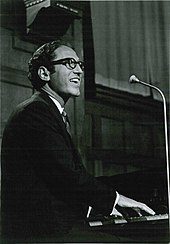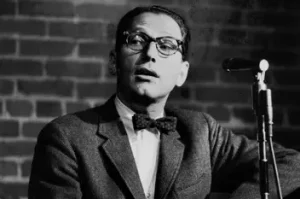Tom Lehrer, the renowned satirical songwriter, pianist, and mathematician whose sharp wit shaped mid-century musical comedy, died Saturday at the age of 97. He passed away peacefully at his home in Cambridge, Massachusetts, according to close friends who confirmed the news.
With a career that blended mathematics and musical satire, Tom Lehrer left an indelible mark on both education and entertainment. From black comedy classics like “Poisoning Pigeons in the Park” to incisive critiques of politics and religion in “The Vatican Rag,” Lehrer became a cult hero and later a national icon during the politically charged 1960s.
A Prodigious Academic Career Shaped by Mathematics and Music
Tom Lehrer was born on April 9, 1928, in New York City into a Jewish family. A musical prodigy, he began studying piano at age 7 and demonstrated exceptional academic ability early on. He enrolled at Harvard University at just 15, earning a degree in mathematics by 18 and a master’s degree a year later.
Though his early ambition leaned toward an academic career, Lehrer soon began writing humorous songs as a creative outlet. This side interest would become the foundation for his musical legacy. Despite his rising fame, Tom Lehrer never abandoned academia; instead, he maintained a dual identity as both scholar and satirist, later teaching at prestigious institutions like Harvard and the University of California, Santa Cruz.

From Underground Cult Fame to Mainstream Recognition
In 1953, Lehrer recorded his debut album Songs by Tom Lehrer at a cost of only $15. Initially intended for friends, the album spread rapidly on college campuses, selling over 10,000 copies through word of mouth alone. With cover art showing Lehrer as a devilish figure at the piano, the album’s success was entirely organic and grassroots.
Tom Lehrer’s clever lyrics and biting social observations earned him a loyal following. His second album, More of Tom Lehrer (1959), produced enduring songs such as “The Masochism Tango,” “The Elements,” and “We Will All Go Together When We Go.” These songs solidified his reputation as a fearless satirist unafraid to address controversial themes through humor and melody.
Time magazine once grouped him with contemporaries like Lenny Bruce and Mort Sahl, labeling him one of the era’s “sick comics.” Lehrer wore this label with ironic pride, calling one of his performances An Evening Wasted with Tom Lehrer.
Television Breakthrough and Political Satire in the 1960s
Tom Lehrer reached national prominence in 1965 when he began contributing weekly satirical songs to the NBC television program That Was the Week That Was. The show offered Lehrer a platform to comment on current events through music. These weekly segments were later compiled into the LP That Was the Year That Was, which became one of his most commercially successful releases, peaking at No. 18 on the Billboard charts.
The album included enduring satirical hits like “National Brotherhood Week,” “So Long, Mom (A Song for World War III),” “The New Math,” and “Send the Marines.” Each song skewered contemporary issues ranging from racism and nuclear warfare to education policy and Cold War politics.
This period marked the height of Lehrer’s public presence. However, he soon withdrew from the limelight, disenchanted with the entertainment industry. “Performing is a pain in the neck,” he once remarked, expressing a preference for academic life over show business.

Later Years Devoted to Education and Cultural Commentary
After his brief time in the public eye, Tom Lehrer gradually transitioned back to full-time academia. He joined the faculty at the University of California, Santa Cruz, where he taught mathematics, musical theater, and logic for many years. His students recalled him as a witty and engaging professor who brought humor into the classroom while maintaining rigorous academic standards.
Though he stopped performing regularly, Lehrer occasionally contributed to cultural projects. In the 1970s, he wrote educational songs for the PBS children’s series The Electric Company, including the catchy grammar tune “Silent E.” He also supported political causes, campaigning for Democratic presidential candidate George McGovern in 1972.
Despite his retreat from the stage, Tom Lehrer’s work remained influential. In the 1980s, a revue titled Tomfoolery introduced his songs to new audiences around the world. In 1998, he made a rare public appearance at a concert in London, delighting fans who had not seen him perform in decades.

A Lasting Legacy of Humor, Intelligence, and Satire
Tom Lehrer’s catalog includes fewer than 40 original songs, yet each one carries significant cultural and comedic weight. His work has influenced multiple generations of comedians, songwriters, and lyricists, including artists such as Randy Newman and “Weird Al” Yankovic. Stephen Sondheim once praised Lehrer as one of the most brilliant lyricists of the 20th century.
In 2020, Lehrer made a remarkable gesture by placing all his lyrics and compositions into the public domain, encouraging others to perform, remix, and reinterpret his work freely. In 2022, he followed through by relinquishing all recording and publishing rights to his music, solidifying his commitment to free cultural access and educational sharing.
Throughout his life, Tom Lehrer remained unmarried and had no children. He preferred privacy to publicity, allowing his music to speak for itself. Despite living much of his later life away from the spotlight, his influence on satire, education, and musical comedy remains undeniable.

